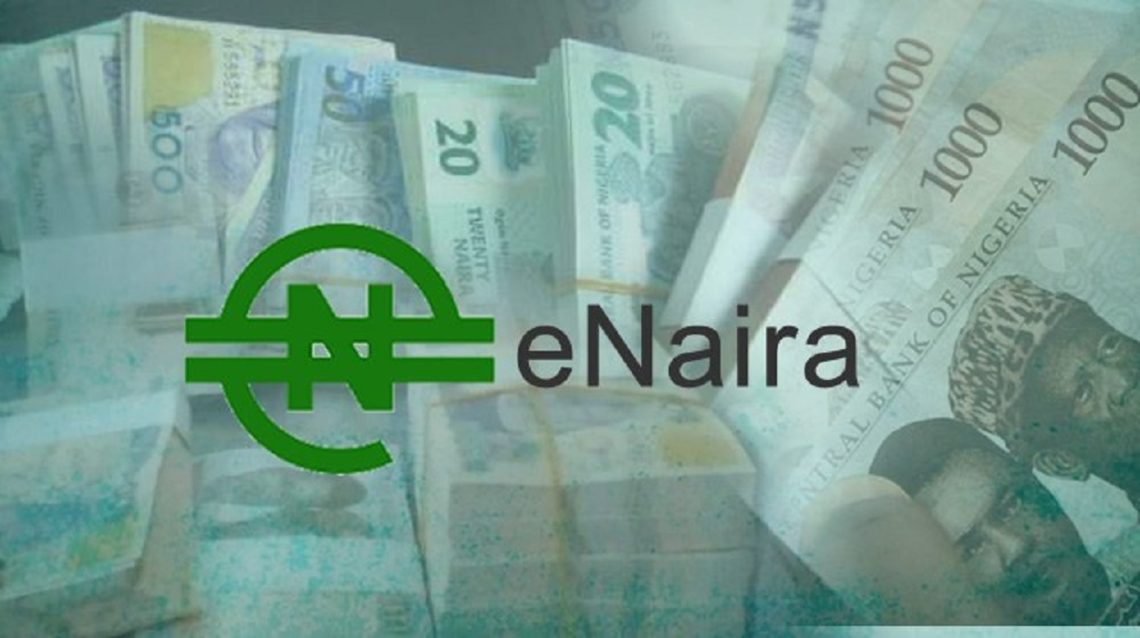Almost a year into the launch of the eNaira, Nigeria’s Central Bank Digital Currency, many are still unaware of the electronic money despite the efforts of the Central Bank of Nigeria (CBN) to drive usage of the CBDC. With the huge cost bank customers bear in terms of charges, the eNaira provides a cheaper alternative as it currently has no transaction cost.
Nigeria is among the first set of countries to launch the CBDC which is a digital representation of the country’s legal tender, the Naira. A digital currency lacks a tangible form such as a bill, check, or coins and is accounted for and transferred using electronic codes in computers and as technology becomes increasingly prominent, payments are becoming more digital, resulting in less use of tangible money.
Different from cash because it improves upon the process for monetary transactions, the argument for a digital currency is that its technological rails can make currency transfers across borders easier and faster as compared to standard money. This form of money also streamlines the process for monetary policy implementation for central banks and given these advantages, digital money has become a priority for several governments around the world.
One of the arguments for digital money is that it takes away the time lag and operating costs for transactions by using distributed ledger technology (DLT). In a DLT system, nodes or shared ledgers connect to form a common network to process transactions. This network can also extend to other jurisdictions and minimise the processing time for transactions. It provides transparency to authorities and stakeholders, improving the resiliency of a financial network by eliminating the need for a centralized database of records.
The CBN launched the eNaira in October last year and according to the apex ban, the digital currency app has seen more than N4 billion in transactions since its launch. Governor of the CBN, Godwin Emefiele, while speaking recently had revealed that the eNaira application has since its launch seen 840,000 downloads, with about 270,000 active wallets comprising over 252,000 consumer wallets and 17,000 merchant wallets.
“In addition, volume and value of transactions on the platform have been remarkable, reaching above 200,000 and N4 billion, respectively. Notwithstanding this appreciable progress, the second phase of the project has begun and it is intended to drive financial inclusion by onboarding unbanked and underserved users leveraging offline channels.
“Hence, greater success is envisioned for the project with phase two expected to deliver more gains with a target of about 8,000,000 active users based on estimations using the diffusion of innovation model,” Emefiele stated.
Specifically, the eNaira is expected to enhance financial inclusion, support poverty reduction, enable direct welfare disbursement to citizens, support a resilient payments ecosystem, improve availability and usability of central bank money, facilitate diaspora remittances, reduce the cost of processing cash, and reduce cost and improve efficiency of cross-border payment among others.
The eNaira was also developed to provide Nigerians with a cheap, safe and trusted means of payment. Unlike the offline payments channels like agent networks, USSD, wearables, cards and near field communication technology, the eNaira would give access to financial services to underserved and unbanked segments of the population.
To increase its appeal amongst Nigerians, the CBN had approved a reward scheme for users of the eNaira, including merchants. This includes providing merchants with the required promotional materials, subsidising the current Merchant Service Charge by 50 per cent and activation of a nationwide sensitisation which early business adopters of eNaira can leverage on to market its wider adoption.
Asides this, the CBN had also rolled out the USSD code for eNaira transactions to capture the unbanked and expand its capture net. It also upgraded the application to enable users pay not only make transfers but also pay bills ranging from electricity, airtime, cable and others.
The availability of eNaira payment option on e-Commerce merchant platform such as Remita is expected to complement the existing digital payment system, translating to about 50 per cent increment in e-commerce transactions and at a lower cost.
Also, the implementation of cross-border transactions in phase three of the eNaira project is expected to increase cross-border trade by about 30 per cent. It is also expected that lower transaction cost would increase the usage, in terms of transaction volume and value of eNaira and improve income generation by businesses. As there are no charges attached to the transactions for users, it is a cheaper alternative for those who seek it.





